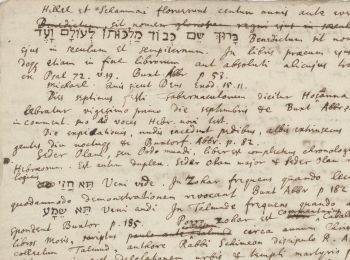| | 18 June, 2007
| | Isaac Newton's manuscripts on apocalypse, Solomon's temple to be exhibited for first time at Hebrew U. | |
 | | A manuscript written by Sir Isaac Newton that includes a line in Hebrew from the Shema prayer (Images: Courtesy of the Jewish National and University Library) |
|
Manuscripts of scientist Sir Isaac Newton – never before revealed to the public – will be on show at the Jewish National and University Library at the Hebrew University of Jerusalem, at an exhibition opening today, Monday, June 18.
The manuscripts include details of Newton's alchemy experiments, his interest in ancient history and apocalyptic prophecies. Furthermore, they reveal his decipherings of what he considered to be ''secret knowledge'' – knowledge encoded in the sacred texts of ancient cultures and other historical records – including his attempts to extract scientific information from the biblical and Talmudic descriptions of the Tabernacle and the Temple. Newton's writings on Judeo-Christian prophecy reveal that he thought of himself as a kind of prophet.
These manuscripts back up speculations that Sir Isaac Newton was a Grand Master of the Priory of Sion secret society (1691-1727), a post also said to have been held by the likes of Leonardo Da Vinci, Botticelli and Victor Hugo, and which inspired Dan Brown's bestseller, 'The Da Vinci Code.'
Sir Isaac Newton (1642-1727), physicist and mathematician, was one of the foremost scientific intellects of all time. Most well known for his ''discovery'' of gravity, Newton also investigated non-scientific subjects, including the form and dimensions of Solomon's Temple in Jerusalem.
Of special interest in this exhibition are manuscripts and illustrations relating to the Temple as well as a passage copied by Newton from Maimonides' writings; manuscripts containing Newton's comments on Hebrew expressions, and excerpts from the Shema prayer; Newton's calculations of the end of the world, which he estimated to be in 2060; and Newton's rejection of the Trinity.
In addition, there are illustrations of experiments and instruments, copies from alchemy books and early editions of Newton's books.
Sir Isaac Newton's nonscientific papers were auctioned at Sotheby's in London in 1936. These included writings totaling close to one million words on alchemy and perhaps as many as three million words on theology and biblical prophecy. Most of the alchemical and theological manuscripts were eventually acquired by two scholars: the British economist John Maynard Keynes, whose collection went to King's College, Cambridge, and the orientalist Abraham Shalom Ezekiel Yahuda. Before his death in 1951, he bequeathed his impressive collection of Newton manuscripts (as well as numerous others) to the newly-founded State of Israel. The collection arrived at the Jewish National and University Library in Jerusalem in 1969. While details of the manuscripts were revealed in 2003, this is the first time that they will be publicly exhibited.
The exhibition will run from June 18 – July 17 and will be open Sundays-Thursdays 9 a.m. – 7 p.m. and Fridays 9 a.m. – 3 p.m. at the Jewish National and University Library at the Edmond J. Safra campus at Givat Ram, the Hebrew University.
For further details about the exhibition, please visit the following site:
http://jnul.huji.ac.il/dl/mss/newton
|
Downloadable File: Newton.doc |
|


